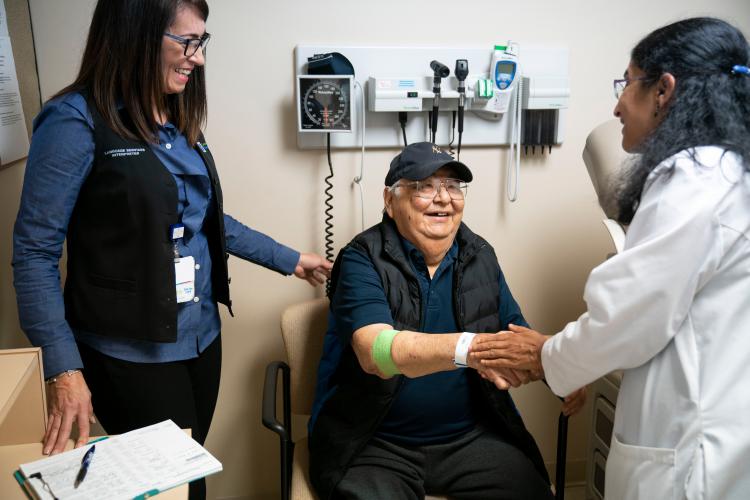
It’s tough enough to be strangers in a strange land who don’t speak the language in their new country.
Imagine how much tougher it would be if you were battling a life-threatening illness and couldn’t even communicate with your doctor about your symptoms or concerns.
To make sure patients know exactly what’s going on with their diagnosis and treatment -- and that they’re never alone in their fight -- JPS Health Network has an army of in-house interpreters who bridge the communication gap. Languages spoken by JPS interpreters include Arabic, Burmese, Farsi, French, Nepalese, Spanish, Vietnamese and sign language. Translation of many more languages is available through video conferencing, should a need arise.
“I believe I am doing something good here, answering my calling,” said Dianna Rodriguez, a Spanish language interpreter who is stationed at the JPS Oncology and Infusion Center. “It makes me happy to be able to help people and I feel like I have an important purpose.”
Rodriguez grew up speaking both Spanish and English in Puerto Rico. A former Emergency Department nurse in her home country, she serves as many as 40 patients and their families each day. Rodriguez does everything from converting health documents from previous care providers into English and explaining to new patients how to fill out paperwork to sitting in a room with the patient and the oncologist when it’s time to discuss the patient’s prognosis and treatment plan.
By the time patients are through with their first visits, Rodriguez already knows them on a first-name basis. They often seek her out as soon as they walk in the door for their next appointment, knowing that instead of bringing a friend with them, they have a friend waiting for them when they get there.
“The best part of my job is when I get to tell people they’re cured,” Rodriguez said. “I’ve shared lots of hugs and some tears of joy.”
The worst part of an interpreter’s responsibility is when the news isn’t good. While doctors are trained to be the ones to give patients the facts about their conditions, it’s often Rodriguez’s voice they hear say the heartbreaking words when test results are unfavorable. She’s cried with the patients. Sometimes, after a tough meeting, she has even had to step outside for a few minutes to gather her emotions before she can move on to the next case. But she can’t take too long, because there is always another patient waiting for her help.
In April, patient Jesus Villalobos waited in a small room with his daughter, Maria, for Rodriguez to share with him the results of his latest examination. As oncologist Kalyani Narra spoke, the father and daughter looked to the interpreter in apprehension, waiting for the explanation of what the oncologist was saying.
Jesus jumped to his feet and shook Rodriguez’s hand when she told him that the doctor said his tumor was shrinking and his blood cell counts looked very good. He didn’t seem to know who to thank more, the oncologist or the interpreter.
“He loves you so much,” Maria told Rodriguez to relay to the doctor. “He says it’s because you do everything with love.”
He then told Rodriguez he loved her too and said, if he had to rate her on a scale of 1-1,000, “you’re a 2,000.”
Narra agreed with the assessment of the interpreter.
“It is certainly a blessing to have Dianna here,” Narra said. “She is very personable and has an excellent rapport with patients. She’s very thorough and makes sure everything is explained thoroughly and carefully. She is tremendously helpful for the patients and the physicians, alike.”
Madiha Sidaros is a health network interpreter serving patients who speak Arabic. She said she can communicate with patients from countries across the Middle East with the exception of Iran and Turkey.
“I’ve been here about 10 years and I love my job,” Sidaros said as she helped patient Emad Yacob, who moved to the United States a few months ago from Egypt, fill out paperwork prior to a visit with a doctor. “It’s very satisfying to know that you’ve helped someone.”
Yacoub said he and his wife only know a few people from their church, so they don’t know where to turn when they hit language barriers. He was greatly relieved to learn JPS had someone to translate for him.
“It made me feel much, much better when I learned they had an interpreter” at JPS, Yacoub said. “I don’t know if people know how important that is, but it’s very, very important to me.”
Vania Medina, manager of Language Services, said more goes into being an interpreter than simply knowing a second language. Team members must be certified that they understand important, technical medical terms in both languages, not just how to have a casual conversation, before they can do the job. A day on the job is never predictable because interpreters don’t know who will come through the door in need of help or what health issue brought the patient to JPS. Interpreters also need to have strong people skills including the ability to be compassionate and tactful.
Rodriguez said she became an interpreter because she wanted a career change from her nursing days. But she still wanted to touch the lives of people in need of care.
“I have had patients who came in for cancer treatments call me four and five years later to tell me they’re doing well and thank me for helping them,” Rodriguez said. “They ask if I remember them. Of course I do, and I’m touched that they remember me.”
